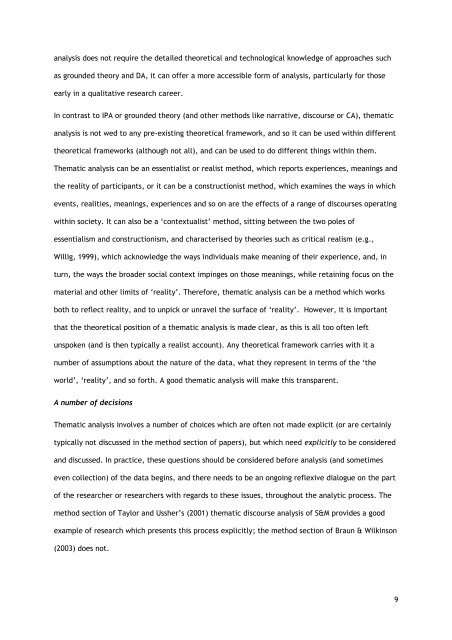Braun, V. and Clarke, V. - UWE Research Repository - University of ...
Braun, V. and Clarke, V. - UWE Research Repository - University of ...
Braun, V. and Clarke, V. - UWE Research Repository - University of ...
You also want an ePaper? Increase the reach of your titles
YUMPU automatically turns print PDFs into web optimized ePapers that Google loves.
analysis does not require the detailed theoretical <strong>and</strong> technological knowledge <strong>of</strong> approaches such<br />
as grounded theory <strong>and</strong> DA, it can <strong>of</strong>fer a more accessible form <strong>of</strong> analysis, particularly for those<br />
early in a qualitative research career.<br />
In contrast to IPA or grounded theory (<strong>and</strong> other methods like narrative, discourse or CA), thematic<br />
analysis is not wed to any pre-existing theoretical framework, <strong>and</strong> so it can be used within different<br />
theoretical frameworks (although not all), <strong>and</strong> can be used to do different things within them.<br />
Thematic analysis can be an essentialist or realist method, which reports experiences, meanings <strong>and</strong><br />
the reality <strong>of</strong> participants, or it can be a constructionist method, which examines the ways in which<br />
events, realities, meanings, experiences <strong>and</strong> so on are the effects <strong>of</strong> a range <strong>of</strong> discourses operating<br />
within society. It can also be a „contextualist‟ method, sitting between the two poles <strong>of</strong><br />
essentialism <strong>and</strong> constructionism, <strong>and</strong> characterised by theories such as critical realism (e.g.,<br />
Willig, 1999), which acknowledge the ways individuals make meaning <strong>of</strong> their experience, <strong>and</strong>, in<br />
turn, the ways the broader social context impinges on those meanings, while retaining focus on the<br />
material <strong>and</strong> other limits <strong>of</strong> „reality‟. Therefore, thematic analysis can be a method which works<br />
both to reflect reality, <strong>and</strong> to unpick or unravel the surface <strong>of</strong> „reality‟. However, it is important<br />
that the theoretical position <strong>of</strong> a thematic analysis is made clear, as this is all too <strong>of</strong>ten left<br />
unspoken (<strong>and</strong> is then typically a realist account). Any theoretical framework carries with it a<br />
number <strong>of</strong> assumptions about the nature <strong>of</strong> the data, what they represent in terms <strong>of</strong> the „the<br />
world‟, „reality‟, <strong>and</strong> so forth. A good thematic analysis will make this transparent.<br />
A number <strong>of</strong> decisions<br />
Thematic analysis involves a number <strong>of</strong> choices which are <strong>of</strong>ten not made explicit (or are certainly<br />
typically not discussed in the method section <strong>of</strong> papers), but which need explicitly to be considered<br />
<strong>and</strong> discussed. In practice, these questions should be considered before analysis (<strong>and</strong> sometimes<br />
even collection) <strong>of</strong> the data begins, <strong>and</strong> there needs to be an ongoing reflexive dialogue on the part<br />
<strong>of</strong> the researcher or researchers with regards to these issues, throughout the analytic process. The<br />
method section <strong>of</strong> Taylor <strong>and</strong> Ussher‟s (2001) thematic discourse analysis <strong>of</strong> S&M provides a good<br />
example <strong>of</strong> research which presents this process explicitly; the method section <strong>of</strong> <strong>Braun</strong> & Wilkinson<br />
(2003) does not.<br />
9

















